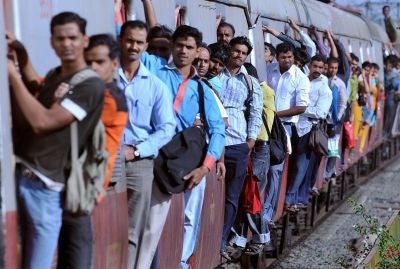Your support helps us to tell the story
From reproductive rights to climate change to Big Tech, The Independent is on the ground when the story is developing. Whether it's investigating the financials of Elon Musk's pro-Trump PAC or producing our latest documentary, 'The A Word', which shines a light on the American women fighting for reproductive rights, we know how important it is to parse out the facts from the messaging.
At such a critical moment in US history, we need reporters on the ground. Your donation allows us to keep sending journalists to speak to both sides of the story.
The Independent is trusted by Americans across the entire political spectrum. And unlike many other quality news outlets, we choose not to lock Americans out of our reporting and analysis with paywalls. We believe quality journalism should be available to everyone, paid for by those who can afford it.
Your support makes all the difference.The daily commute in the Indian city of Mumbai could be about to get more pleasant, thanks to a new loan designed to improve its struggling railways.
The Mumbai suburban rail network is one of the most crowded in the world, ferrying millions of people every day around India's business hub in conditions that are hot and uncomfortable.
The World Bank recently announced a US $430 million (€339 million) loan to help improve capacity, which it said sometimes sees 4,500 passengers at densities up to 16 people per square meter in nine-car trains with an official capacity of just 1,700.
The money will be spent on up to 720 new trains, which will be longer, faster and more comfortable for passengers.
Additional track and new stock have already been added since the start of the project in 2002, with capacity increased 7-10 percent during the rush hours, reducing the travel time of hundreds of thousands of passengers.
“The first Mumbai Urban Transport Project has already managed to reduce the level of crowding in suburban trains from 4,500 to 4100 passengers per 9-coach train at peak hours in spite of traffic increase,” said Hubert Nove-Josserand from the World Bank.
“This follow up project will further improve the capacity, operational efficiency, level of comfort and strengthen the institutional capacity of the agencies in charge of the suburban rail system in the Mumbai Metropolitan area.”
The World Bank estimates that some 6.4 million people every day used the Mumbai surburban rail network in 2006-7, which represented more than half of motorized trips in the metropolitan region.

Join our commenting forum
Join thought-provoking conversations, follow other Independent readers and see their replies
Comments